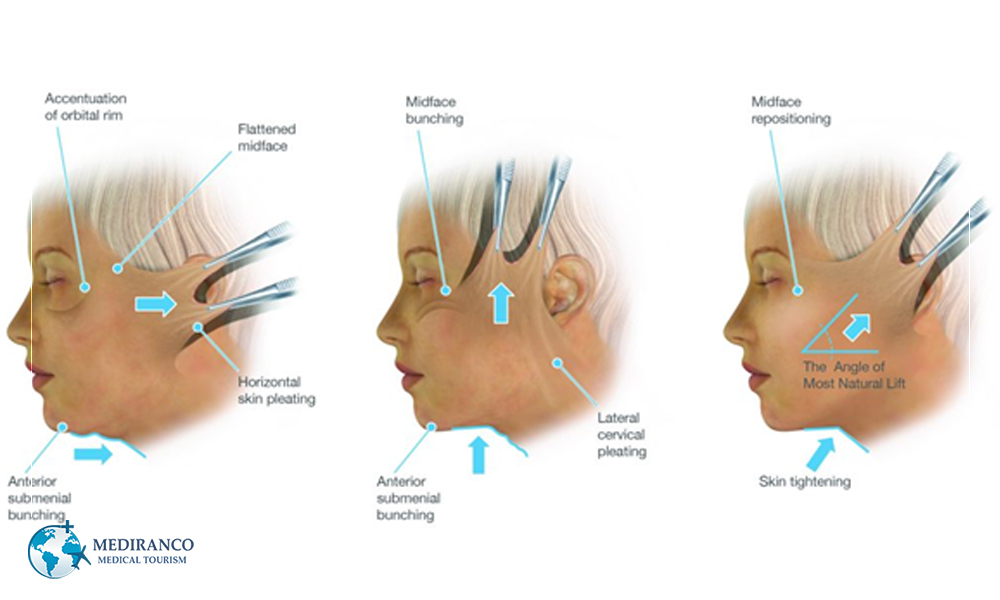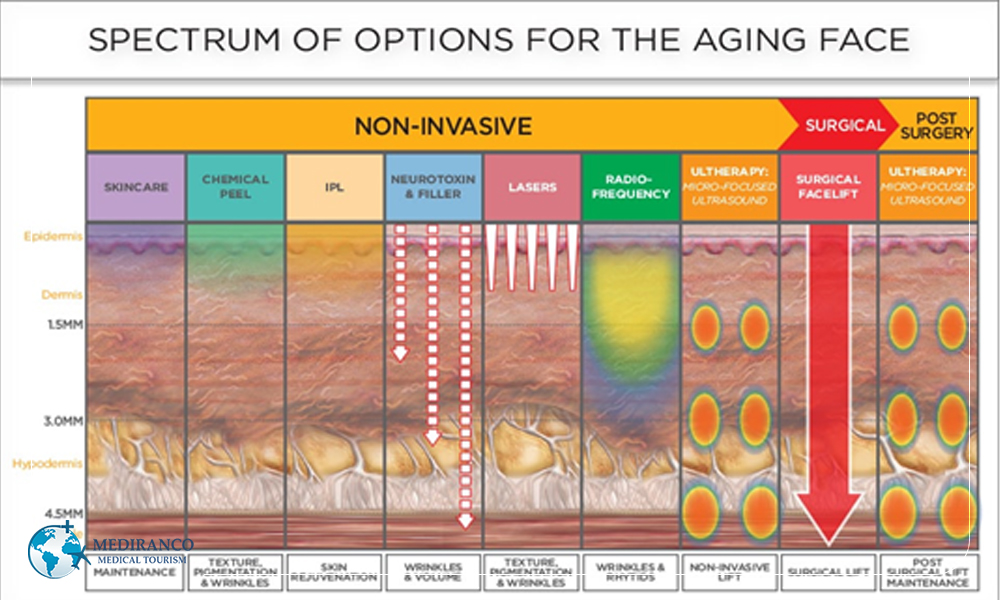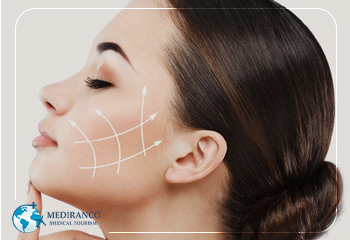Non surgical facelift vs surgical facelift: Collagen and elastin are the two main structural proteins in the skin responsible for skin’s strength and elasticity. As we age, the existing collagen and elastin breaks down and our skin’s ability to produce them deteriorates. This process leads to wrinkles and sagging skin, particularly around the face. With the advancement of cosmetic industry, new ways has been introduced to fight the signs of ageing. There are several options for treatment, including surgical and non-surgical facelifts. In this article, we’ll talk about what these are, as well as some of the pros and cons.
In this article we will discuss:
- What is surgical face lift?
- How many hours does face lift surgery take?
- What is non-surgical facelift?
- Non-surgical facelift techniques
- What is the difference between surgical and non-surgical facelift?
- Who is the ideal candidate for non-surgical facelift?
- How long does a non surgical facelift last?
- How long does a surgical facelift last?
Table of Contents
ToggleWhat is surgical face lift?
The traditional or surgical facelift is also called a Rhytidectomy. There are several types of surgical facelifts, each of which targets different areas of the face but they all have the same process of tightening the skin via repositioning and pulling back the skin and underlying muscle to create a youthful look. Then the excess skin is completely removed. There may also be a need for transferring of fat deposits to your face to adjust facial muscles or provides additional volume to sunken areas. The most common type of surgical facelift targets the neck and lower part of the face using incisions around the ears to access the deep tissue beneath the skin. Mid-facelift concentrates on lifting the cheeks and minimizing crow’s feet. A successful facelift can take up to 10 years off your face and the results can last for 5 to 20 years.

A key factor is to have a balance between restoring youth and maintaining your individual looks and characteristics. That’s why it’s so important to choose a very skillful and experienced surgeon.
How many hours does face lift surgery take?
This procedure will take 1 to 4 hours and during that time you will be under general anesthesia. The down time for this this procedure is about 2 weeks. As with any surgery, certain risks are associated with a surgical facelift such as swelling, bruising, infection and discomfort during recovery.
This is a wonderful procedure for older people who have significantly large wrinkles and deep creases, and sagging facial muscles or jawline.
What is non-surgical facelift?
Non-surgical facelift do not require large incisions, general anesthesia or overnight hospitalization and they have a minimal downtime. These procedures are usually short and can be completed within an hour. There is also minimal discomfort and pain after the procedure. The results are more natural, your skin becomes plumped and volumized and overall you’ll have a more youthful look.
Non-surgical facelift techniques
There is a wide range of non-surgical facelift techniques available. Some of them are as followed:
Botox injections:
Botox temporarily relaxes tense muscles that can lead to wrinkles. You can get the injection between your eyebrows, in their forehead (frown lines) or at the corners of your eyes (crow’s feet). Botox does not provide immediate wrinkle relief, however you will see results in one to two weeks. Results can last up to three months.
Chemical peels:
chemical peel involves applying a solution to the face to remove dead skin cells at the top layers of your skin and stimulate the growth of new cells. It can help reduce large pores, minimize wrinkles and reveal newer, firmer skin. You may need multiple sessions to achieve your desired results.
Dermal fillers:
injections add volume back to sunken areas of the face such as the cheeks, temples, lips and under the eyes. Or they can be placed along the Nasolabial Folds or Marionette Lines to create definition and smooth tissues for a wrinkle-free look. Dermal fillers can be made from several products, including Hyaluronic Acid (most commonly used), Calcium hydroxylapatite, Poly-L-lactic acid, etc. The results can last anywhere from six months to several years.
Fat injections:
fat injection is a semi-invasive procedure. At first liposuction is used to take fat from a different area of your body. After that the fat cells will be cleaned and processed, and then reinjected into the face to enhance facial volume. In this method the results last for years.
Microdermabrasion:
This is a minimally invasive procedure that uses fine crystals and a vacuum to exfoliate and remove dead skin cells. The exfoliation can help reduce the appearance of fine lines, mild scars, hyperpigmentation and other skin concerns. You may need multiple sessions, usually a few weeks apart. The results can last for several months.
Microneedling:
Microneedling involves pricking the skin with tiny sterilized needles which will stimulate the production of collagen and elastin in your skin. It will improve the appearance of wrinkles, scars, acne, large pores and sun damage but you will see the results after 3 to 6 months. You may need multiple sessions, usually about three to eight weeks apart.
Ultherapy:
Ultherapy is an FDA-approved procedure which uses a smooth applicator with focused ultrasound energy, using the right temperature to support collagen regeneration. The heat energy is aimed at different depths, affecting three layers: Muscle, skin and superficial wrinkles. This will gradually lift the skin on your neck, chin, and brow, minimizing any fine lines and wrinkles. You can see the first signs of improvement within a few days, depending on your body’s ability to produce new collagen. Improvement usually continues for up to three months
ThermiTight:
ThermiTight is a procedure that involves making a small incision by your doctor in a strategic location and inserting a small surgical probe underneath the skin which uses radio-frequency energy that directly targets the collagen layer and heats it to the temperature needed to trigger optimal collagen production. It will result in tightening the skin and you can see the results immediately.

What is the difference between surgical and non-surgical facelift?
Nonsurgical facelift techniques don’t have the risks associated with a surgical procedure but still there may be some side effects like blister, bruises, dry or itchy skin, scars, swelling, redness, etc. In rare cases, botox injections and dermal fillers can lead to fever, headache, nausea and vomiting or skin rash
Who is the ideal candidate for non-surgical facelift?
Nonsurgical facelift is more suited for younger patients who display less advanced signs of ageing. If you are looking to lift and plump the skin, whilst simultaneously adding definition and contouring, you will benefit greatly from a non-surgical face lift. This is also a great alternative for patients who have respiratory or heart diseases and cannot tolerate anesthesia.
You might not be good candidates for a nonsurgical facelift if you have pre-existing skin conditions, such as active acne, eczema, psoriasis, skin burns or skin rashes, etc.
How long does a non surgical facelift last?
Although a non-surgical facelift is relatively cost-effective and you can see significant results, the result may only last for about 6 months to a year. As it was mentioned above, noninvasive treatments need to be repeated every few months to maintain optimal results. This results in the need for added costs for touch-ups. This could make non-surgical facelifts as or even more expensive than traditional surgical facelifts in the long run.
How long does a surgical facelift last?
In conclusion if you’re looking for long-lasting results or have deep wrinkles, extremely loose or sagging skin or severe scars, surgery may be the better option for you. Although a surgical facelift is more expensive that a non-surgical facelift but non-surgical facelift requires frequent sessions to maintain results whereas the result of a surgical facelift can last up to 20 years. So overall a surgical facelift is more cost effective.
If you are considering doing a facelift, it is important that you consult with a trained professional to determine the procedures that are best suited to your individual needs and expectations. Mediranco health tourism company will provide consultation with the best plastic surgeons to help you chose the best treatment. If you have any more questions, you can contact our support team and they will answer all of them. By choosing Mediranco you will get the best results at the best possible price.

